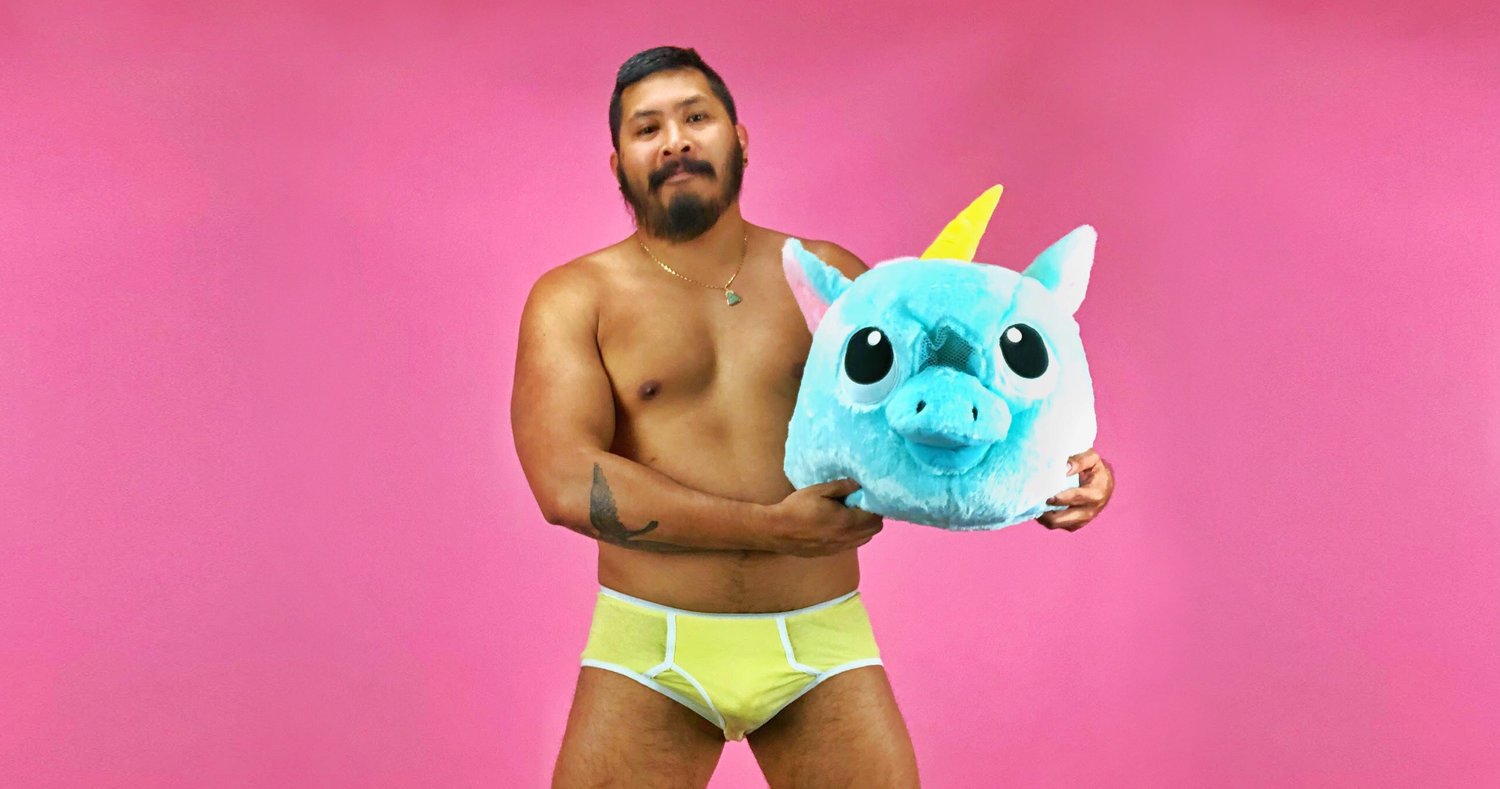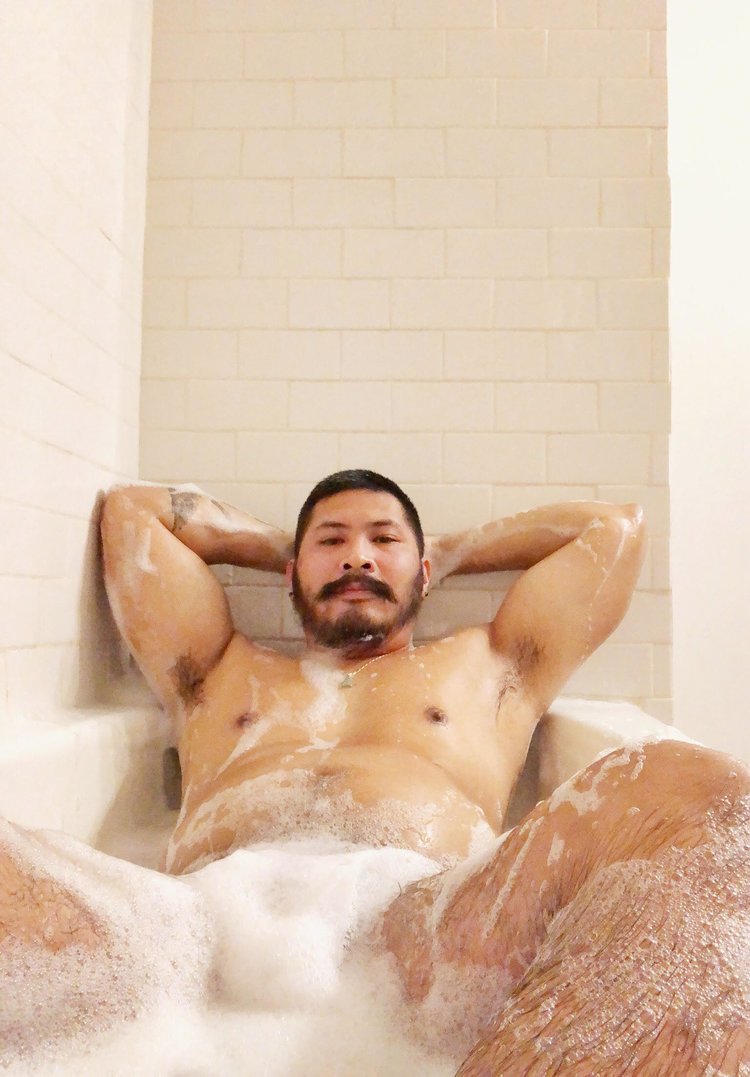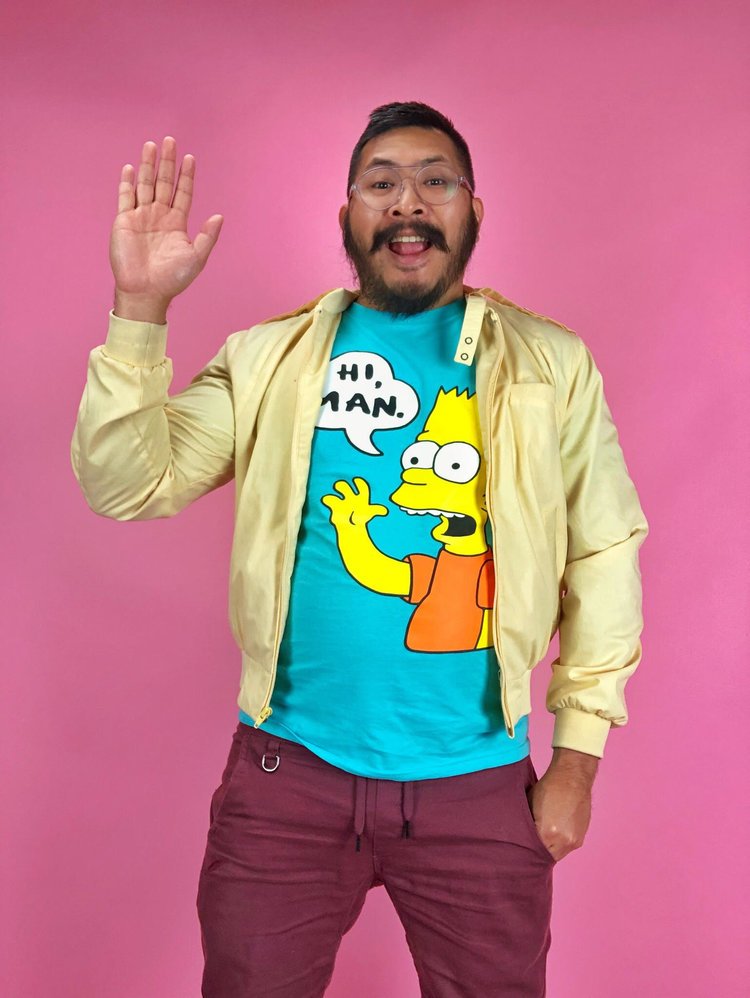Atlanta Artist weaponizing body positivity against the 'No Asians' mentality
PHOTOS COURTESY OF KHANH NGUYEN (@SOMEASIANDUDE)
Khanh Nguyen, a.k.a Instagram’s @someasiandude, is putting down all his thirst trap cards on the battlefield! This hunky nerd is making a name for himself as not another Nick Jonas thirst trap replicant, but instead as an authentically vulnerable persona and advocate for body positivity.
Body positivity is a tricky but important message in the age of social media. Most of us scrolling through our Instagram feed know from experience how intense and overwhelming the pressure to maintain an image can be. We’re bombarded with sponsored advertising and search algorithms, which direct users to verified accounts of social media influencers and celebs with - for the most part - insane body standards. But as much as we like, repost, and save these images, they can promote unhealthy habits and have a negative impact on users’ body image.
In the midst of this social media frenzy are accounts like Khanh Nguyen’s. Khanh’s Instagram feed is a mosh posh of nerdy memorabilia, art appreciation, and of course the much-loved thirst trap pics. His page is quickly gaining a following of over 10,000 followers in less than a year’s time. Along with his posts, Khanh is active in the queer Atlanta scene taking photos of drag events and spotlighting important activism around the city.
Khanh’s social media activity opens up a dialogue with his fans and raises important questions about representation; like is it possible for social media apps like Instagram to be used to promote more inclusiveness and queer POC bodies instead of shitty detox teas? Can thirst traps posts that we love to share be used to showcase different body types? While he reflects on these on questions, Khanh discuses what body positivity means, his experiences with discrimination, and social media’s role in shaping people’s body image.
How would you describe body positivity?
Body positivity goes hand in hand with mental health. It means to be able to look at yourself and say “Yes, I love myself.” It’s being able to see yourself and not think you’re unattractive or unwanted. It’s also about putting yourself out there and seeing how people react.
When we hear ‘body positivity’ we sometimes assume someone who is body positive means they have no insecurities or doubts about their body. Does body positivity mean not having insecurities?
Body positivity does not mean having absolutely any insecurities. Everyone has them. Body positivity means to acknowledge those insecurities and put them out there anyways and celebrate who you are. It’s helped that with whatever I’ve been insecure about I’ve gotten positive responses from others.
But also you shouldn’t feel you need others acknowledgment to feel good about yourself. It needs to come from you first.
You’ve quickly gained a following on Instagram with your posts about body positivity, nerd culture, and art. How has your social media activity changed your relationships and your view on body image?
The effects have been more personal than say my relationships or friendships. The people that already know me have stated that they think it’s awesome and it’s important. So what’s changed for the better is my own feelings of self-worth. Before, I never saw myself as an attractive person or loved myself growing up. But now I do! I can view myself and say “You are human, you are attractive, you are desired, you are valid”.
Most people, including myself, struggle to make time for self-love and care throughout their day. Do you have a mantra or a ritual that helps you live a body positive lifestyle?
My mantra is to take care of myself mentally and surround myself with supportive people. I’ve always been a person who exercised my mind over my body, but one day I started to incorporate exercise.
Honestly, the exercising does help on a different level. In public people try to talk to me more and I do get more attention in general. This is all very new to me and I’m still struggling with how to handle going from pretty much being invisible to a highly visible person.
Really? If I was scrolling through your Instagram feed I would have never guessed that about you. I think everyone, who uses social media, forgets there’s a barrier and beyond our phone screen is a person who’s facing their own battles. Were you always comfortable with your body or did you struggle growing up to accept yourself?
Unfortunately no. The image wasn’t there before. I’d see myself and didn’t like what I saw.
I grew up in an area called Taft in Orlando, FL. It’s mostly full of white trailer park types. When I was in school I was bullied constantly, whether it was because I was a small child or because I’m Asian and brown. Other students would go around calling me racial slurs and would mimic shooting guns at me and say things like “We won the war” (referring to the Vietnam war). Boy were they wrong, but I was a child and didn’t know any better. I didn’t know how to handle it, so I cried a lot. That would then trigger them to make fun of me for crying.
My family would also echo this at home by mocking me for not being an athletic person who was good at sports. I enjoyed art, chorus, and reading. I wanted to stop being picked on for being brown and effeminate. I grew to hate everything that I was. This led me down a path of many years of depression, self-hate, and isolation.
When did the transition happen for you going from feeling self-conscious to being confident in your own skin?
Probably around when I started taking photos of myself. The reception was really positive. I guess people out there like what I look like. Beforehand, I didn’t have that. Of course, there was encouragement from my boyfriend Austin. Him saying, “You got to put yourself out there more! I want you to be more comfortable! I want you to be okay with your body.” There was that too. I wouldn’t say I was 100% okay or comfortable.
Your Instagram byline says, "Body positivity against the 'No Asians' mentality." Can you explain what the 'No Asians' mentality is and when you came across it on social media or gay dating apps?
The “No Asian’s Mentality” has existed for as long as media has been a thing. Asian men in media are usually the quirky sidekick or comic relief and never the leading man or a person that other characters find attractive. This has seeped into social media. So many times I’ve scrolled past “NO ASIANS” on dating or hookup profiles. Even people that I’ve met have uttered the phrase “You’re cute…for an Asian guy” or “I normally don’t date Asian guys but…”
That’s awful!
It’s so demeaning. I grew up never seeing myself as desirable except for the few that fetishized me for just being Asian. They didn’t notice anything else about me except that I am Asian.
Has anyone on Instagram reached out to you to share their experiences? What have those interactions been like for you?
Ever since I started posting more photos of myself and my body, I’ve received messages from other Asian men stating things like “Your body positivity makes me feel less bad about my brown body.” These mean so much to me. I never thought that I would be the one to provide this type of support for others. If I can help even just a few people not have to go through years of self-doubt and hate over their bodies. It’s all worth it to me.
How do you think social media app likes Instagram can be used to advocate for healthy body images?
With Instagram, you can build your own narrative with who you follow. You can promote it (body positivity) by putting yourself out there and interacting with others who do the same. If you see someone feeling themselves in a post and putting themselves out there, interact with them and let them know that they are seen.
Finally, what would be your advice to anyone out there who is struggling with their body image?
Put yourself out there and find your niche. Honestly! Everyone has a niche, and when you find your niche you really start to flourish. That’s the hardest and best thing you can do for yourself. There’s someone and something out there for everyone. You just have to get out there and find it. Be it, someone you’re in a relationship with or friends you want to hang out with. There are people out there who will see your body as a positive. You just have to find it in yourself somehow, whether interacting or finding people similar to you.
—
Stevie King is a freelance writer and comedian with a mild obsession for burning down ice cream trucks. They've often been mistaken for Jack Antonoff, Jason Schwartzman, and your mom.
Archive
- September 2025
- August 2025
- May 2025
- February 2025
- November 2024
- October 2024
- September 2024
- August 2024
- July 2024
- June 2024
- May 2024
- April 2024
- October 2023
- July 2023
- June 2023
- May 2023
- April 2023
- March 2023
- February 2023
- June 2022
- April 2022
- March 2022
- January 2022
- December 2021
- October 2021
- September 2021
- August 2021
- July 2021
- June 2021
- May 2021
- April 2021
- March 2021
- February 2021
- January 2021
- December 2020
- October 2020
- September 2020
- August 2020
- July 2020
- June 2020
- May 2020
- April 2020
- March 2020
- February 2020
- January 2020
- December 2019
- November 2019
- October 2019
- September 2019
- August 2019
- July 2019
- June 2019
- May 2019
- April 2019
- March 2019
- February 2019
- January 2019
- December 2018
- November 2018
- October 2018
- September 2018
- August 2018
- July 2018
- June 2018
- May 2018
- April 2018
- March 2018
- February 2018
- January 2018
- December 2017
- November 2017
- October 2017
- September 2017
- August 2017
- July 2017
- June 2017
- May 2017
- April 2017
- March 2017
- February 2017
- January 2017
- December 2015
- November 2015
- October 2015
- September 2015
- August 2015
- July 2015
- June 2015
- May 2015
- April 2015











